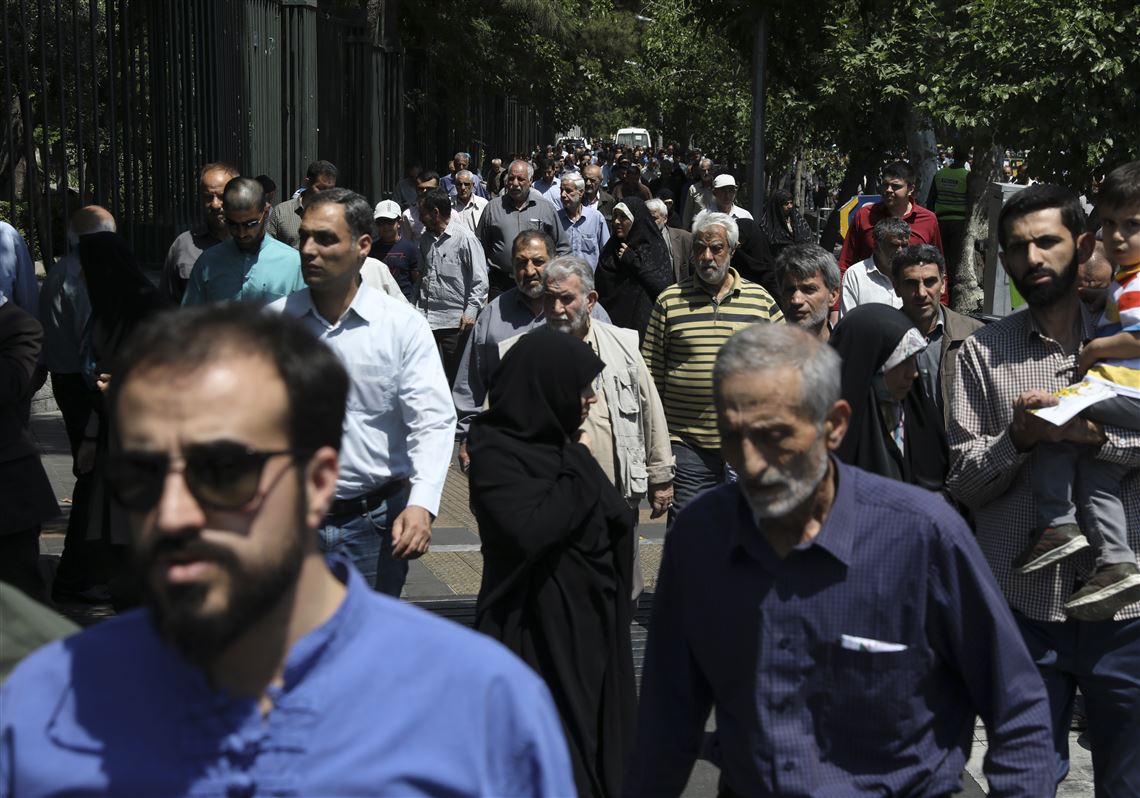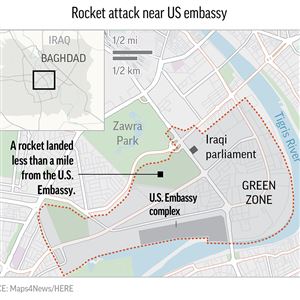WASHINGTON - President Donald Trump warned Sunday that threats from Iran against the United States would mark that nation’s “official end” - taking a sharply more aggressive tone after a rocket landed inside Baghdad’s fortified Green Zone near the U.S. Embassy amid increasing tensions in the region.
No one has claimed responsibility for the incident, which caused no injuries or serious damage, but suspicion among Iraqi officials and Western diplomats fell on one of the Shiite militias that draw their strength from Iranian support.
Hours earlier, a top Saudi diplomat said that Riyadh does not want war but will not hesitate to defend itself against Iran after the kingdom’s energy sector was targeted this past week amid heightened tensions in the Persian Gulf.
“If Iran wants to fight, that will be the official end of Iran,” Mr. Trump tweeted Sunday afternoon. “Never threaten the United States again!”
That appeared to be a considerable shift in tone from the president’s brief remarks at the White House on Thursday, when he responded “I hope not” after being asked whether the United States and Iran were headed toward war.
Mr. Trump, who announced last year that he would withdraw the United States from a landmark 2015 deal aimed at curbing Tehran’s nuclear ambitions, has indicated privately in recent days that he prefers a diplomatic approach to defuse the renewed tensions in the Middle East.
Concerned that his more hawkish advisers could push the United States into a military confrontation, Mr. Trump, who campaigned on withdrawing the United States from entanglements abroad, has indicated that he wants to speak directly with Iranian leaders.
But his threatening language Sunday echoes rhetoric he used against North Korea in 2017, when he warned of “fire and fury” against the regime of Kim Jong Un before ultimately holding direct talks with the North Korean leader in Singapore and Vietnam.
The White House did not immediately return a request Sunday for comment on what prompted the tweet, which was sent about 1½ hours after Mr. Trump returned to the White House from his golf club in Sterling, Virginia.
Mr. Trump has repeatedly complained, through Twitter and in public comments, about the coverage of the infighting within his administration over how to approach Tehran.
“The Fake News Media is hurting our Country with its fraudulent and highly inaccurate coverage of Iran,” he tweeted Friday. “It is scattershot, poorly sourced (made up), and DANGEROUS. At least Iran doesn’t know what to think, which at this point may very well be a good thing!”
Meanwhile, Adel al-Jubeir, the Saudi minister of state for foreign affairs, spoke a week after four oil tankers— two of them Saudi — were targeted in an alleged act of sabotage off the coast of the United Arab Emirates and days after Iran-allied Yemeni rebels claimed a drone attack on a Saudi oil pipeline.
“The kingdom of Saudi Arabia does not want war in the region and does not strive for that... but at the same time, if the other side chooses war, the kingdom will fight this with all force and determination and it will defend itself, its citizens and its interests,” Mr. al-Jubeir told reporters.
In the wake of Sunday's explosion outside the U.S. Embassy compound in Baghdad, fears of armed conflict were already running high after the White House ordered warships and bombers to the region earlier this month to counter an alleged, unexplained threat from Iran. The U.S. also has ordered nonessential staff out of its diplomatic posts in Iraq.
The U.S. Navy said Sunday it had conducted exercises in the Arabian Sea with the aircraft carrier strike group ordered to the region to counter the unspecified threat from Iran. The Navy said the exercises and training were conducted Friday and Saturday with the USS Abraham Lincoln aircraft carrier strike group in coordination with the U.S. Marine Corps, highlighting U.S. “lethality and agility to respond to threat,” as well as to deter conflict and preserve U.S. strategic interests.
The current tensions are rooted in Mr. Trump’s decision last year to withdraw the U.S. from the 2015 nuclear accord between Iran and world powers and impose wide-reaching sanctions, including on Iranian oil exports that are crucial to its economy.
Saudi Arabia’s King Salman, meanwhile, has called for a meeting of Arab heads of state on May 30 in Mecca to discuss the latest developments, including the oil pipeline attack. The kingdom has blamed the pipeline attack on Iran.
The Associated Press contributed.
First Published: May 20, 2019, 12:38 a.m.















